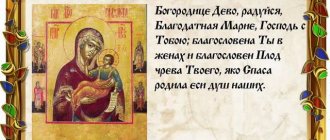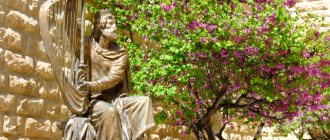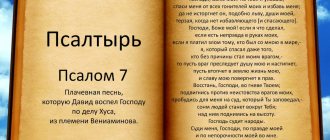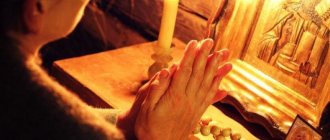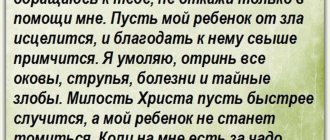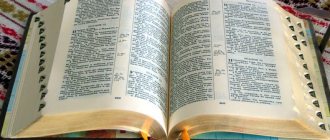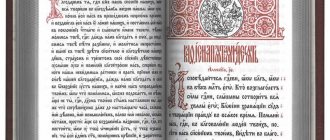History of writing
There are two versions of how the sacred text was created. Some theologians believe that David wrote it at the beginning of his reign, when, after the death of his parents, he was forced to take the throne. Surrounded by ill-wishers, the king turns to the Creator for help to protect him from disasters. Others put forward the theory that the prayer was written in the last years of the life of the ancient Israeli ruler. Be that as it may, the poems clearly express courage, courage, reverence for the Creator and the call to always rely only on Him.
Psalm 26 is a song for help
Small Bible
The collection was created over 800 years.
Moses started it, then David, his son Solomon, other priests and prophets. The book of psalms received its completed form during the times of Ezra and Nehemiah. Some texts are attributed to unknown authors, but most are from the hand of King David. He is deservedly considered a pillar of holiness, a Spirit-bearing mentor and the Greatest prophet of God. The texts contain all the Gospel provisions, both the history of the Old Testament and the messianic prophecies about Christ. They cover the period of the beginning of God's revelations about Himself, ending with the end of times. In essence, it is the Small Bible, containing the enlightenment of the Holy Spirit. The power of prayers lies in the fact that they were created not by the human mind, but under the influence of Grace that the authors had.
Note: The impact on the soul and consciousness of the reader can be either stunning, sanctifying a person, or insignificant. Everything depends on the state of receptivity to God with which one approaches the texts. A proud and passionate nature will not meet with a response unless it finds points of contact with the Grace of the Holy Spirit. She will remain cold and distant from Divine speeches. And vice versa.
Brief interpretation and meaning
Psalm 26 is one of those songs in the Psalter that can be called praise and instruction. In the first verse, David talks about his unshakable faith in God the Father, that He is the basis of his life. Further, the author expresses sincere confidence that his enemies will not get the better of him, since the Lord himself is on his side.
Verses four through six are permeated with deep love and admiration for the Creator. The king believes that he is completely safe under his shadow. He promises to praise Him, to lift up joyful songs and hymns to Him, to serve Him.
The next three verses are a call for help, a request not to abandon Your servant. At the end of the psalm, David asks the Creator to help him cope with temptation, protect him from lies, evil, and prevent his death.
The most common words spoken by Christ: Rejoice and Do not be afraid
Various musical instruments are mentioned in the book of psalms. This is no accident. Unlike our Divine Services, the Jewish ones were much more fun and dynamic. They not only sang, but also danced. Remember the transfer of the Ark, when King David's wife reproached him for dancing in the procession like a commoner.
To which I heard an answer that will surprise many: How can you not rejoice before the Lord? Many people think that God is strict and opposed to human joys. In fact, it's the other way around. It is where He is that a person feels happy. On the spiritual level - blissful.
Reference: The psalter is a plucked musical instrument, to the accompaniment of which ancient prayers were most often sung. It is unknown what he looks like. Some people depict it as looking like a harp. Other historians compare it to a guitar.
How does prayer help?
Psalm 26 is one of the most powerful songs in the prayer book. It is read in times of great danger, asking the Lord to protect from death and disaster. Prayer helps:
- protect yourself from enemy attacks;
- prevent the grief they can bring;
- save your life, your loved ones, as well as property and livestock;
- recover from diseases;
- protect yourself from the envy or anger of ill-wishers.
During the war, St. Ambrose of Optina instructed to turn to this great prayer during shelling. Those who sincerely pray will definitely be spared by an enemy bullet or shell.
Saving life
Healing from diseases
Protection from the envy or anger of ill-wishers
The meaning of prayer in Orthodoxy
There is probably no person who has not been subjected to various kinds of attacks throughout his life. It happens that the people around us are annoying, there are problems in the family, there are problems with the children, and you never know from which direction the troubles of life approach us, and the soul trembles with sorrows and sorrows.
Sincere prayer from the bottom of the heart is the main weapon of believers against the forces of evil that attack them. It can work miracles if a person turns to God with all his wounded heart and sincere faith.
And then the Lord promises that even “if an army takes up arms against me, my heart will not fear; if war arises against me, then I will hope.” These words of the prophet David, who in his life was repeatedly exposed to mortal danger, should teach every person who believes in God fearlessness in all the dangers of life and undoubted hope and trust in Him.
“I asked one thing from the Lord, this only do I seek, that I might dwell in the house of the Lord all the days of my life, to contemplate the beauty of the Lord and to visit His holy temple.” The psalmist experiences high religious feelings and all believers, following him, will also ask the Lord to seek and want only one thing - to be with the Lord until the end of their days, not to fall away from Him, not to leave the temple where He resides, guides all our deeds, thoughts, words .
The 26th Psalm is one of those that you need to know by heart. According to one of the Optina elders, priest John (Sokolov), “all arrows will fly by, neither fire will take, nor water will drown,” if you read two psalms every day - the 26th and 90th, with the obligatory addition before each prayers “Virgin Mother of God, Hail, full of grace Mary.” If you include the 26th Psalm in your morning prayers, then after a while you can memorize it and then read it at any time without a prayer book.
How to read Psalm 26 correctly
The 26th hymn is usually read together with two more psalms (50 and 90), as well as the Praise to the Most Holy Theotokos. The Greetings to the Virgin Mary are said first, and only then three texts of the Psalter are read out in a row.
During services, chanting usually takes place in Church Slavonic. If it is difficult for you to perceive it, then you can pray in Russian at home. Some priests recommend lighting a candle or lamp, but this is not necessary. The main condition is the sincerity of the person praying, complete concentration on the conversation with God, as well as strong faith in the spoken words.
For convenience, it is better to use not the Bible, but a prayer book. It contains verses already divided into parts, arranged in the necessary order.
What do the psalms have to do with us?
Despite the fact that the texts were compiled by Old Testament saints, they are included in the Divine service, filling up to 20% of the prayers read. During the week, the psalter is read in full (150 Ps.), and during Great Lent twice during the same period. Therefore, in some way it cannot be said that by our time they have lost relevance.
Everything created by God, His words, appeals to the human soul are eternal, like Himself. Psalms are read or sung:
- at the Liturgy:
- All-night vigil;
- hours;
- Six Psalms.
Note: At parish services, the reading of kathismas (translated as “sit”) is usually shortened. They do not reproduce the circle of prayers prescribed by the rules, unlike monastic prayers, where the entire kathismas are voiced.
There is the concept of “Indestructible (indestructible) psalter. Basically, this is monastic work. In the monasteries, reading in song goes on continuously. The monastics take turns chanting kathisma after kathisma (150 prayers are divided into 20 parts). After each, they remember the health and repose of those for whom notes were submitted.
Note: To correct unfavorable events in life, to help a person find the right path, to recover, to get rid of a vice, they order remembrance by reading the indestructible psalter. It is also necessary to pray for the newly deceased (at least 40 days), or if you often dream about the dead.
Text of Psalm 26 in Russian
Since not all Christians fully understand Church Slavonic, the 26th Psalm (like the entire Psalter) was translated into modern language.
1 The Lord is my light and my salvation: whom shall I fear? The Lord is the strength of my life: whom shall I fear?
2 If evildoers, my adversaries, and my enemies come against me to devour my flesh, they themselves will stumble and fall.
3 If an army takes up arms against me, my heart will not fear; if war arises against me, then I will hope.
4 One thing have I asked of the Lord, this only do I seek, that I may abide in the house of the Lord all the days of my life, to contemplate the beauty of the Lord, and to visit His [holy] temple,
5 For He would have hidden me in His tabernacle in the day of trouble, He would have hidden me in the secret place of His habitation, He would have lifted me up on the rock.
6 Then my head would be lifted up above the enemies around me; and I would offer sacrifices of praise in His tabernacle, and would begin to sing and make melody before the Lord.
7 Hear, O Lord, my voice with which I cry, have mercy on me and give ear to me.
8 My heart says from You: “Seek My face”; and I will seek Your face, O Lord.
9 Hide not Your face from me; do not reject Your servant in anger. You were my helper; do not reject me and do not forsake me, O God, my Savior!
10 For my father and my mother have forsaken me, but the Lord will receive me.
11 Teach me, O Lord, your way, and guide me in the path of righteousness, for the sake of my enemies;
12 Do not deliver me up to the mercy of my enemies, for false witnesses have risen up against me and breathe out malice.
13 But I believe that I will see the goodness of the Lord in the land of the living.
14 Trust in the Lord, be of good courage, and let your heart be strengthened, and trust in the Lord.
Any prayer is direct communication with the Almighty. A text thoughtlessly read will not save or help; it is only a way to turn to the Creator. The Psalter opens the way to God only to true Christian believers.
If you find an error, please select a piece of text and press Ctrl+Enter.
Psalm 26: content and interpretation
Like all the songs that make up the Psalter, the 26th Psalm is divided into short verses for convenience. There are 14 of them in total. The Psalm was composed by David during a dramatic period of his life. The prophet Samuel had already anointed him as king, but the young man had not yet ascended the throne. For some time he continued to serve at the court of King Saul.
The people loved David: he was not only a brave warrior, but also a gifted musician. He was also married to the king's daughter. Despite this, Saul began to hate David because he saw him as a potential rival for the throne. Several times the king tried to kill the young man. David was forced to hide from persecution until Saul's death.
During the period of persecution, David felt that he was under the protection of God. The future king composed Psalm 26 to express love for the Lord and faith in His Providence. He continues to pray to the Almighty for intercession and help in following the true path. Professor of Theology A. Lopukhin notes:
“David prays to God to help him to be pure in his affairs, and no matter how difficult his present situation is, not to allow him, even out of necessity, to commit any crime and break His Law” (“The Explanatory Bible”).
In the psalm, David mentions the sad separation from the Fatherland and relatives. But the future king emphasizes that with God he is not afraid of any sorrows. The author asks the Creator to give him the opportunity to return to his homeland and again attend such soul-sweet services. David says that he wants to contemplate and sing of Divine beauty for the rest of his life.
For what reason is Psalm 26 read, its meaning
From the inscription above the text we learn that it belongs to David, compiled before the anointing (there were three of them) to the kingdom after the death of Saul. According to Arsenius of Cappadocia (Elder Paisius of Athonite), in certain circumstances, the reading of the psalm that most closely matches the occasion, the resolution of a misfortune or problem, is blessed. Thus, according to his classification, canto 26 helps:
- Protect peasants (people) from enemy invasion.
- Avert the trouble and harm that they can cause.
- Save your property, house, fields, so that nothing is lost.
- Enlist the support and protection of the Heavenly Forces.
Note: According to one Optina elder, if during military operations (when they are bombed), read psalms: 26; 50; 90, not a single shell will hit the house, or where people are.
